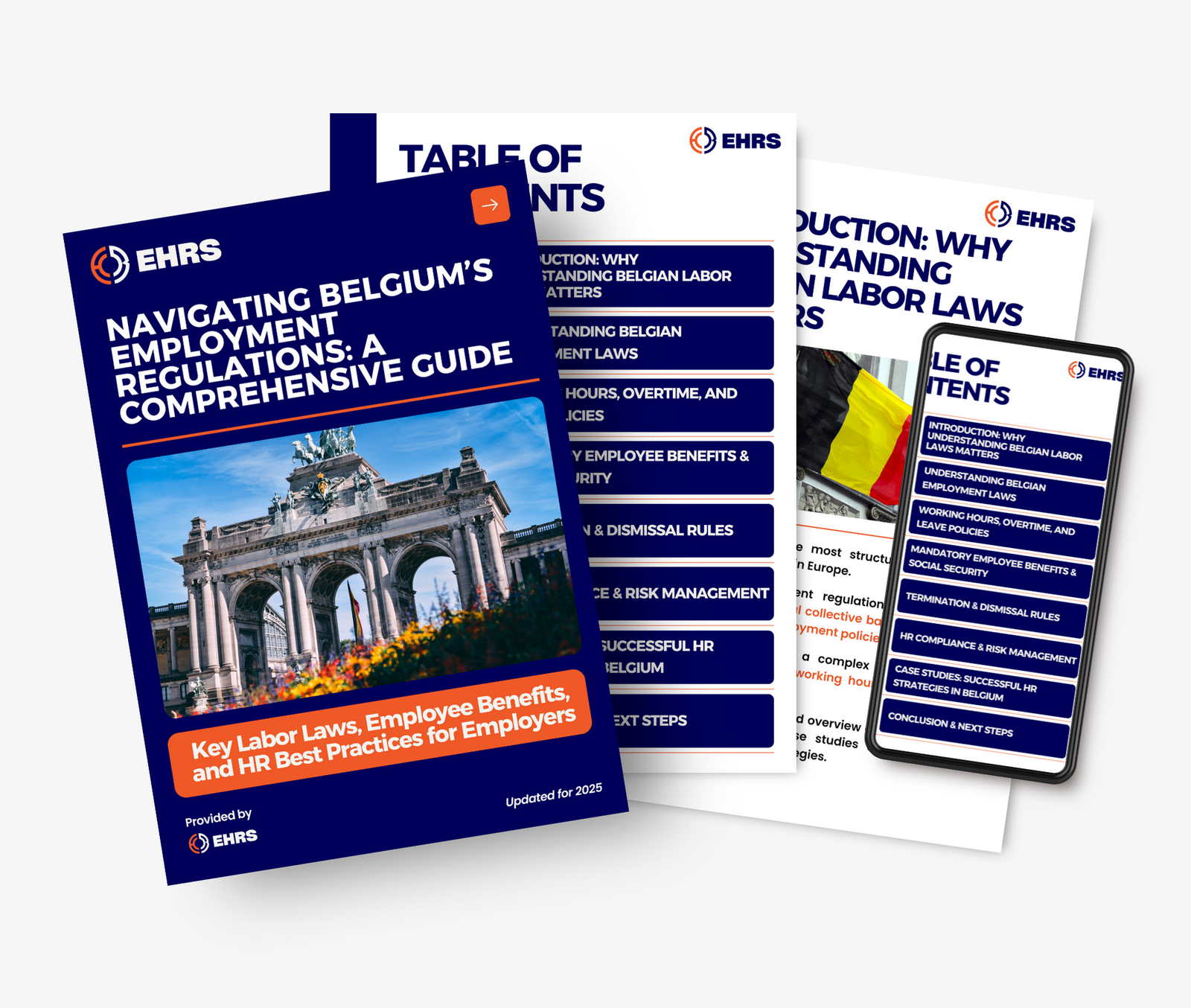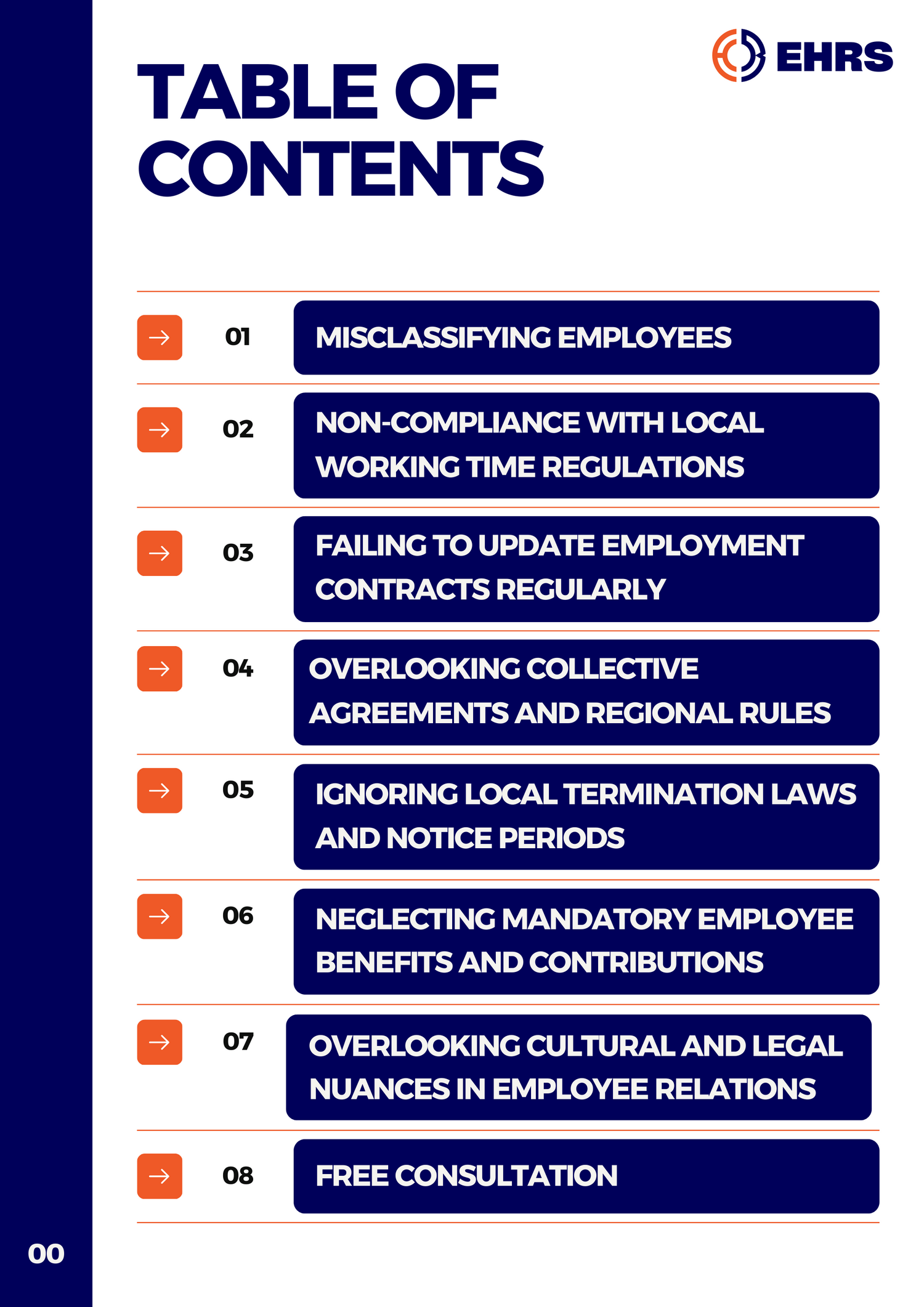BELGIUM
List of countries
HR Services for Belgium
Hire in Belgium without opening a local entity. We manage employment contracts, social security registration, payroll, and HR compliance so you can expand quickly and confidently.
Belgium is an attractive site for US and UK companies for many reasons, including its ideal location in Europe and its skilled, multilingual workforce. Business owners in the US and the UK are eyeing Belgium as the site of their expansion into Europe.
There are already more than 900 US businesses operating in Belgium, and more than 17,000 UK-owned businesses in the country.
ALL YOU NEED TO KNOW ABOUT
HR OUTSOURCING IN BELGIUM
BELGIAN EMPLOYMENT
REGULATIONS TO KNOW
THE BENEFITS OF
EXPANSION IN BELGIUM
THE CHALLENGES OF
EXPANSION IN BELGIUM

Check our free HR guide to help you quickly improve your HR in Belgium
FAQ for Belgium
Learn more about Belgium
Free Download
Request your free guide and receive it immediately

All You Need to Know About Outsourcing
Your HR in Belgium with EHRS
Seamless HR Management
Outsourcing your HR to Euro HR Solutions simplifies managing payroll, benefits, and compliance in Belgium. Our tailored HR services for Belgium cover all administrative and operational HR tasks, ensuring you meet local legal requirements while focusing on your business goals.
Compliance Expertise
Belgium’s complex labor laws require strict adherence to rules surrounding employment contracts, social security contributions, and collective labor agreements. Our expertise ensures your HR operations remain fully compliant.
Tailored Solutions for Your Business
We offer customizable HR services to meet your company’s specific needs, from recruitment and onboarding to training and performance management. This flexibility supports your growth and scalability in Belgium.
Belgium Employment Regulations to Know
Employment Contracts
Belgian law mandates written employment contracts that define job roles, compensation, working hours, and termination clauses. As part of our comprehensive HR services for Belgium, we ensure all contracts comply with collective bargaining agreements (CBAs) applicable to your industry.
Social Security Contributions
Employers in Belgium must register with the National Social Security Office (ONSS) and make contributions covering pensions, healthcare, and unemployment benefits. These contributions are mandatory and vary depending on the employee’s role and salary.
Holiday Entitlements
Belgium provides statutory annual leave based on the number of days worked in the previous year. Employees are entitled to at least 20 days of paid leave for full-time work, plus public holidays.
The Benefits of Expansion in Belgium
Strategic Location
Located at the heart of Europe, Belgium offers easy access to neighboring countries, making it a prime hub for trade and business expansion across the continent.
Skilled, Multilingual Workforce
Belgium’s workforce is highly educated and multilingual, with proficiency in Dutch, French, German, and English, making it ideal for businesses targeting diverse markets.
Stable Business Environment
Belgium’s well-established infrastructure, strong economy, and government support for businesses create a stable and attractive environment for foreign companies.
The Challenges of Expansion in Belgium
Complex Labor Laws
Belgium has intricate labor laws, including strict rules on working hours, employee termination, and benefits. Navigating these regulations requires specialized HR expertise.
High Labor Costs
Employers in Belgium face high labor costs due to social security contributions and mandatory benefits, which can significantly impact budgets without effective planning.
Cultural and Linguistic Diversity
Belgium’s multilingual regions (Dutch-speaking Flanders, French-speaking Wallonia, and German-speaking areas) require tailored HR strategies to address cultural and language differences effectively.
Talk to an HR specialist about payroll, compliance, and audits today.
Expand into Belgium with confidence.
Most Asked Questions
About Belgium
What types of employment contracts are used in Belgium?
Belgium recognizes fixed-term, indefinite-term, and student contracts. Indefinite-term contracts are the default, while fixed-term contracts must specify an end date and comply with strict renewal rules to avoid automatic conversion to indefinite-term contracts.
What types of employment contracts are used in Belgium?
Belgium recognizes fixed-term, indefinite-term, and student contracts. Indefinite-term contracts are the default, while fixed-term contracts must specify an end date and comply with strict renewal rules to avoid automatic conversion to indefinite-term contracts.
Are employees entitled to overtime pay, and how is it calculated?
Yes, overtime must be compensated either with time off in lieu (1.5 hours for each overtime hour) or a higher hourly rate (50%-100% premium, depending on the timing).
What are the legal vacation entitlements for employees in Belgium?
Employees are entitled to four weeks of paid leave annually, based on the number of days worked in the previous year. Additional leave can be offered by employers or under CLAs.
What types of leave are employees entitled to (e.g., parental leave, sick leave)?
Employees are entitled to various leaves, including parental leave, sick leave (paid by the employer for the first 30 days), and time off for family or medical emergencies. Special leaves (e.g., for weddings or funerals) may also apply under CLAs.
What are the notice period requirements?
Notice periods depend on the employee’s length of service, starting from two weeks for short-term contracts to several months for long-term employees. The notice must be served in writing.
Are CLAs mandatory in Belgium, and how do they affect employment terms?
Many industries are governed by CLAs, which set terms for wages, benefits, and working conditions. These are legally binding and must be followed if applicable to your industry.
What are the implications of not following a CLA?
Non-compliance can result in financial penalties, legal challenges, or reputational damage. Employee disputes often arise when CLA terms are ignored.
What additional benefits do companies typically offer to stay competitive?
Common perks include eco-cheques, company cars, flexible work arrangements, and additional insurance plans. These benefits enhance employee satisfaction and retention.
What are the employer’s obligations for tax and social security contributions?
Employers must contribute to Belgium’s extensive social security system, covering health, pensions, unemployment, and family allowances. These are deducted as a percentage of gross salaries.
Are there tax advantages for hiring expats or foreign employees?
Yes, Belgium offers tax advantages for expats, such as the Special Tax Status for Foreign Executives, which provides benefits like tax-free reimbursements for relocation costs.
What are the legal obligations for consulting employee representatives?
Works councils must be consulted on significant organizational changes, including restructuring, redundancies, or workplace policies.
What permits are needed to hire non-EU employees in Belgium?
Non-EU employees typically require a Single Permit, combining work and residence authorization. Highly skilled workers may qualify for fast-tracked procedures.
How does Belgium’s single permit system work?
The Single Permit simplifies hiring by combining work and residence authorization into one process. Applications must be filed with the regional employment authority.
How do I ensure compliance with Belgian labor laws?
Regular audits, updated employment contracts, and adherence to CLAs are essential. Partnering with local HR experts can ensure full compliance.
How are fixed-term contracts and indefinite-term contracts regulated?
Fixed-term contracts are limited to successive terms of two years maximum unless approved by specific sector agreements. Indefinite-term contracts are governed by Belgium’s labor laws, including strict termination procedures.
What is the maximum number of working hours allowed per week?
The standard workweek in Belgium is 38 hours. Extended hours are possible under flexible work arrangements, but average hours cannot exceed this limit over a reference period (typically four months).
What flexibility exists for managing work schedules?
Belgium allows flexible work schedules under specific agreements, but these must comply with labor laws and be outlined in employment contracts or workplace regulations.
How are public holidays managed, and what happens if they fall on a weekend?
Belgium recognizes 10 public holidays. If a holiday falls on a weekend, it must be replaced by a substitute day, usually agreed upon at the workplace level.
How can employers legally terminate an employee in Belgium?
Terminations require valid reasons, notice periods, and severance payments, depending on the employee’s tenure. Wrongful termination can lead to financial penalties or reinstatement orders.
How is severance pay calculated, and when is it required?
Severance pay is calculated based on tenure and salary. Employees dismissed without notice receive compensation equal to the notice period’s duration.
How do I determine if my industry is governed by a specific CLA?
Industry-specific CLAs are outlined by Belgium’s National Labor Council. Employers should verify with local unions or legal advisors to determine applicability.
What benefits are mandatory for employees in Belgium?
Mandatory benefits include social security coverage, health insurance, and meal vouchers in many industries. Pension contributions and holiday pay are also required.
How do meal vouchers and eco-cheques work?
Meal vouchers are tax-advantaged benefits provided for each workday. Eco-cheques, capped at €250 per year, are used for environmentally friendly purchases and are non-taxable for employees.
How are salaries taxed in Belgium, and what deductions apply?
Belgium has one of the highest tax rates in Europe. Employers deduct income tax and social contributions from salaries, and employees can receive some tax advantages depending on their circumstances.
When is a company required to establish a works council in Belgium?
Companies with 50 or more employees must establish a health and safety committee, while those with 100+ employees must also form a works council.
How does Belgium’s system of social elections work?
Social elections are held every four years to elect employee representatives for the works council. Employers are responsible for organizing these elections.
What are the conditions for hiring highly skilled workers or expats?
Employers must prove that the candidate meets minimum salary thresholds and has unique qualifications not readily available in the local labor market.
What are the key requirements for setting up payroll in Belgium?
Payroll must comply with Belgium’s labor laws, including accurate tax withholding, social contributions, and adherence to minimum wage and CLA rules.
What are the penalties for non-compliance with employment or tax regulations?
Non-compliance can result in fines, back payments, legal actions, or even suspension of business activities. Staying compliant is critical to avoiding these risks.



